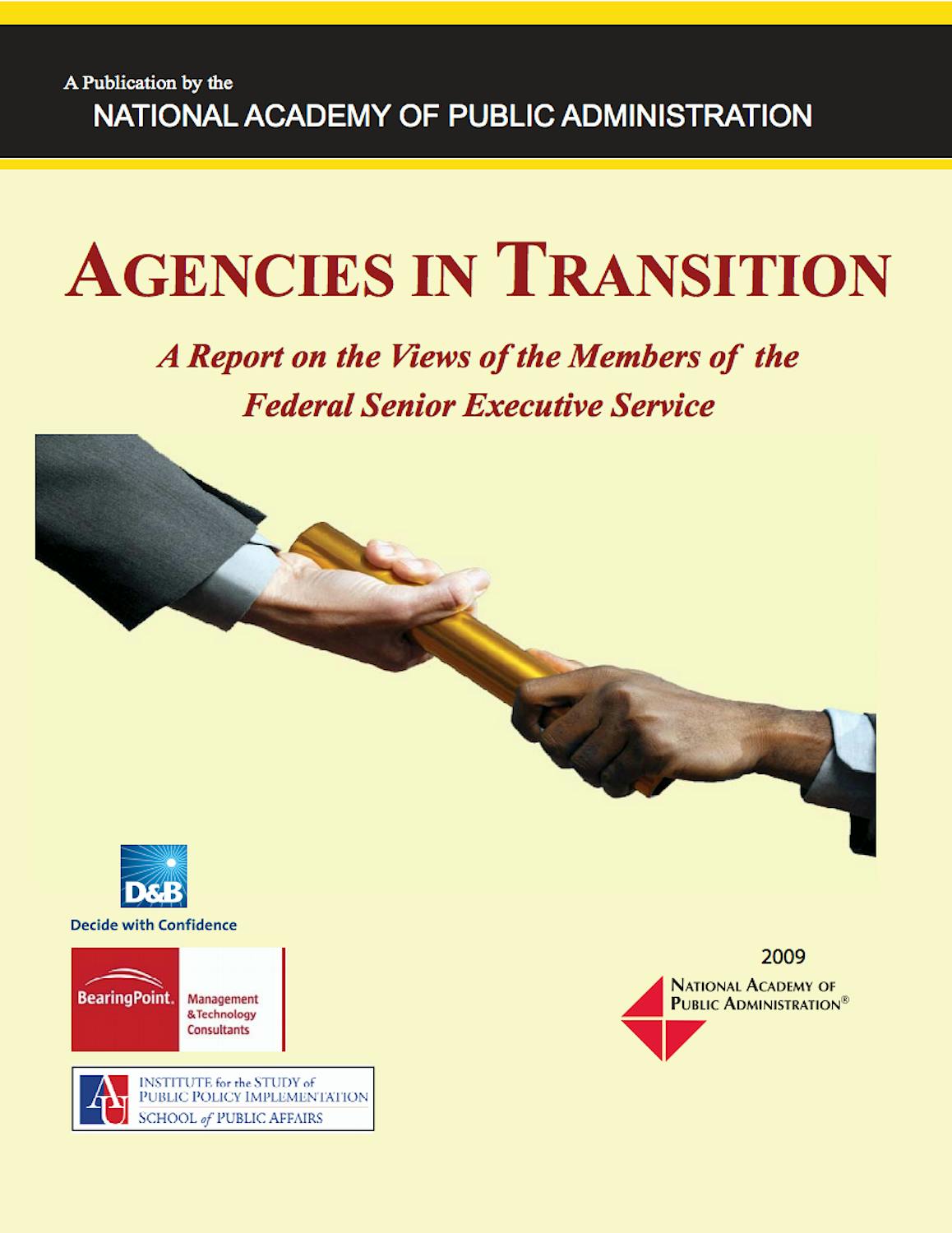
Agencies in Transition: A Report on the Views of the Members of the Federal Senior Executive Service
Many think of leadership transition in government as something that happens only once every four or eight years.
While presidential transitions are undoubtedly the largest in scope, leadership transition in government is a constant process. In fact, the average tenure of Senate-confirmed appointees is only 3.3 years, while appointees at executive departments generally spend only 2.8 years in a single post. In a federal government made up of departments and agencies as large and complex as any Fortune 500 company, a strong leadership team is critical to effective governance. Members of the Senior Executive Service (SES) serve as the primary link between political appointees and the broader federal workforce, operating and overseeing nearly every government activity. They play a significant role during leadership transitions, ensuring the continuity of operations within government. Members of the SES are also uniquely positioned to help incoming political leaders build on the positive reforms of the past, and provide insight from lessons learned that can inform success in the future. The National Academy saw the 2008 Presidential transition as an opportunity to draw upon the experience of the SES to find ways to strengthen the partnerships between political and career leaders and build a more efficient and effective government. The results of our study reinforced the critical role played by members of the SES, and revealed that the majority of these career leaders, though experienced in government, were relatively new to managing transition issues as executives.
Click the button below to view the View Study Report.
View ReportKey Findings
The findings demonstrated that despite the newness of presidential transitions for most SES, they have a clear understanding about the role they must play in assisting new political appointees, the importance of forming an effective partnership, and their role in the process. At the same time, they wanted help to prepare for those roles, and were eager to engage in training and other activities that would promote success. These SES preferred to receive assistance in preparing for the transition through:
- policy briefings;
- discussions with their peers;
- written materials; and
- attendance at seminars or training sessions.
Recommendations
Prepare Your Organization
- Prepare materials for the new leadership that will inform them of what they need to know, without overwhelming them with the details. The information should convey both:
- A clear understanding of the agency, its mandate, resources (people and dollars), and stakeholders; and
- A snapshot of the critical challenges facing the agency, together with data, analysis and options to inform new leadership in making policy choices. • Set a positive tone for the change in leadership for your staff—they will follow your lead. Explain to staff how the transition process works and keep them informed about the status of the transition process.
Prepare Yourself
- Know your role as a subject matter expert and resource, not as the public “face” of the organization. Know your organization and your place within it. The challenge is to maintain stability among the permanent staff and the functionality of the agency during the transition period while working closely with the PA to minimize their learning curve and enable them to maximize their effectiveness, right from the start.
- Learn all you can about your new political leadership. Read up on their experience, accomplishments, management style, and background before they arrive. Be prepared to take the conversation beyond the briefing books and to help the incoming PA build relationships with the team that will help them succeed.
- The transition will require long hours and short time frames to accomplish goals. You personally must be prepared both mentally and physically for offering the support your new leadership will require.
Prepare for a New Working Relationship
- Your new leadership will rely on your knowledge of external stakeholders and key Congressional contacts. Help them understand who your organization works with, who can help, and who can hurt.
- Change is the mandate, and incoming leaders will bring a host of new ideas. Be open to hearing a fresh perspective, and focus on possibilities. This will greatly strengthen your partnership and facilitate a good working relationship.
- The new leaders will rely on your insight and expertise, but you must understand when and how to offer that insight. Avoid “information overload,” but provide honest counsel when called upon.
